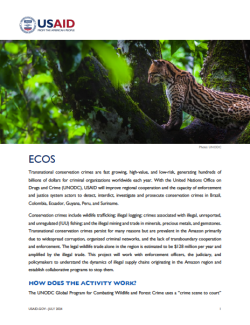Transnational conservation crimes are fast growing, high-value, and low-risk, generating hundreds of billions of dollars for criminal organizations worldwide each year. With the United Nations Office on Drugs and Crime (UNODC), USAID will improve regional cooperation and the capacity of enforcement and justice system actors to detect, interdict, investigate and prosecute conservation crimes in Brazil, Colombia, Ecuador, Guyana, Peru, and Suriname.
Conservation crimes include wildlife trafficking; illegal logging; crimes associated with illegal, unreported, and unregulated (IUU) fishing; and the illegal mining and trade in minerals, precious metals, and gemstones. Transnational conservation crimes persist for many reasons but are prevalent in the Amazon primarily due to widespread corruption, organized criminal networks, and the lack of transboundary cooperation and enforcement. The legal wildlife trade alone in the region is estimated to be $128 million per year and amplified by the illegal trade. This project will work with enforcement officers, the judiciary, and policymakers to understand the dynamics of illegal supply chains originating in the Amazon region and establish collaborative programs to stop them.
HOW DOES THE ACTIVITY WORK?
The UNODC Global Program for Combating Wildlife and Forest Crime uses a “crime scene to court” approach, directly supporting law enforcement, prosecutors, judges, and wildlife, forest, and fisheries authorities to improve national, regional, and international criminal justice and preventive responses to environmental crimes. UNODC will apply this approach in the Amazon and target action along the entire criminal chain, linking the region’s local, national, and regional enforcement and justice system efforts.
To reduce conservation crimes and decrease the national and international trade of illegally harvested natural resources, UNODC and the USAID Amazon Region Environmental Program (AREP) will work on three main objectives: (1) Strengthen the coordination of transnational enforcement action in tri-border areas; (2) Strengthen criminal provisions within relevant legal frameworks; and (3) Build capacity for effective investigation and prosecution of conservation crimes at the national level. UNODC will implement the activity in six countries of the region, focusing on tri-border country areas in the Amazon.

